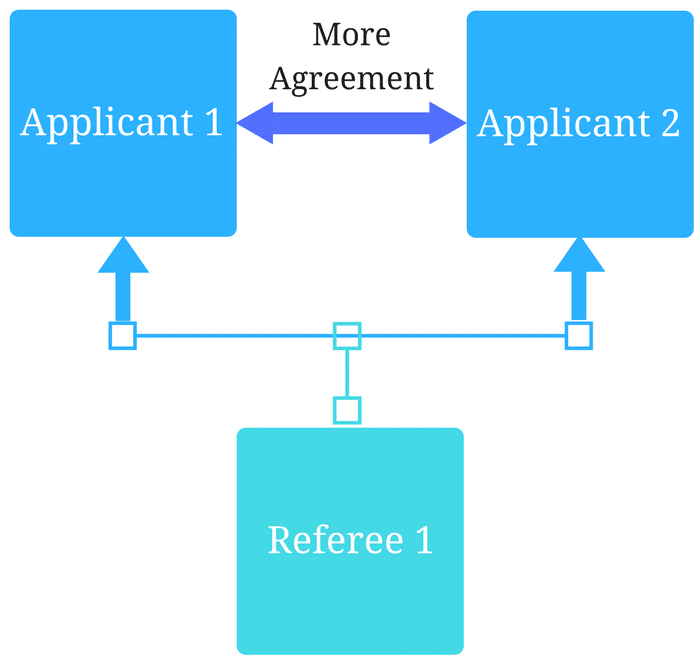What admissions factors are associated with academic and professional success?

May 5, 2021
While research shows that applicants’ GPA is associated with academic success, particularly in more technical and knowledge-based courses, it does not tell the whole story. Predicting success on the job, especially in people-centered professions, is much more complex and requires the consideration of non-cognitive competencies.
We definitely see how important these competencies are in health care, a field that is currently experiencing a massive compassion crisis. However, finding and training more compassionate physicians can help remedy the problem as research shows increased compassion leads to better patient outcomes, resource efficiency, and even improved well-being among physicians and their patients.
We also know the importance of varied life experiences in delivering quality care in under-served communities as patients prefer to be treated by doctors who look like them. However, relying on GPA and other cognitive metrics can potentially exclude well-rounded candidates who have traditionally not been well represented in medicine.
So what should programs look for outside of GPA?
As we’ve noted above, GPA can predict academic success to an extent, but it isn’t completely reliable in determining career success. As more programs adopt holistic admissions models, applicants will be evaluated based on their cognitive and non-cognitive strengths, background and experiences, long-term goals, and alignment with the program’s mission.
Frameworks published by regulating bodies such as the Association of American Medical Colleges (AAMC), Accreditation Council for Graduate Medical Education (ACGME), and CanMeds also emphasize the importance of specific non-cognitive competencies in medical students and health care workers, including:
- Collaboration
- Communication
- Compassion
- Empathy
- Ethics
- Fairness
- Grit
- Motivation
- Professionalism
- Problem solving
- Resilience
- Self-awareness
Although the tools used in holistic admissions vary from program to program, it’s not uncommon for admissions professionals and faculty to use interviews, personal statements, and reference letters to assess non-cognitive competencies. However, these methods have proven to be unreliable. Programs need a standardized and data-driven method to reliably assess these competencies in the same way GPA and standardized tests assess cognitive abilities. Tools have emerged in recent years to meet this challenge, including our Casper situational judgment test, which assesses 9 of these competencies, and Duet, which measures mutual alignment between applicants and programs in terms of what they value and prioritize in a program.
What proof do we have that these competencies matter?
Although longitudinal studies on these competencies are still emerging, there is existing evidence that demonstrates the value of these competencies and their association with future success. We’ve already noted that physicians who practice compassion-based care can improve their patients’ outcomes. Research from Angela Duckworth and Duke University was able to link grit to the success of cadets at West Point Military Academy. Another study focused on physician assistant training also found that a higher grit score was correlated with increased resilience and resistance to burnout.
As for professionalism, the research is clear. 95% of disciplinary action reported to the medical board in the US was attributed to issues of professionalism. Another study involving surgical residency programs revealed up to 30% of all residents required at least one remediation intervention, costing programs up to $5,300 per episode. That same study also found that attrition rates for some specialties ranged anywhere from 20% to 40%.
As for the predictive validity of the tools used to assess these competencies, research for Casper in the medical field shows a high correlation with MMI performance, and Casper was also shown to predict performance on the Canadian licensure exams, which can be used as a surrogate for non-cognitive performance in the profession. A study with the University of Alberta revealed that Casper had a higher correlation with first OSCE performance than GPA, and the University of Saskatchewan reported an 80% reduction in professionalism issues as well as a 92% reduction in remediation costs after using Casper.
Discover more outcomes research
Longitudinal studies on the impact of these competencies and the tools used to assess them are still in the works, but early evidence is promising. If you’re interested in learning what outcomes programs have reported since factoring in non-academic performance in their decision-making processes, then watch these presentations from the 2021 Admissions Summit:
Related Articles

How interviews could be misleading your admissions...
Most schools consider the interview an important portion of their admissions process, hence a considerable…
Reference letters in academic admissions: useful o...
Because of the lack of innovation, there are often few opportunities to examine current legacy…
